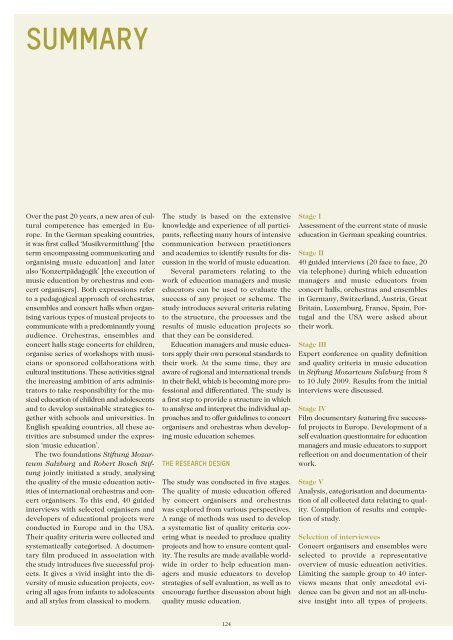exchange die kunst, musik zu vermitteln - Kunstdervermittlung.at
exchange die kunst, musik zu vermitteln - Kunstdervermittlung.at
exchange die kunst, musik zu vermitteln - Kunstdervermittlung.at
Sie wollen auch ein ePaper? Erhöhen Sie die Reichweite Ihrer Titel.
YUMPU macht aus Druck-PDFs automatisch weboptimierte ePaper, die Google liebt.
SUMMARY<br />
Over the past 20 years, a new area of cultural<br />
competence has emerged in Europe.<br />
In the German speaking countries,<br />
it was first called ‘Musikvermittlung’ [the<br />
term encompassing communic<strong>at</strong>ing and<br />
organising music educ<strong>at</strong>ion] and l<strong>at</strong>er<br />
also ‘Konzertpädagogik’ [the execution of<br />
music educ<strong>at</strong>ion by orchestras and concert<br />
organisers]. Both expressions refer<br />
to a pedagogical approach of orchestras,<br />
ensembles and concert halls when organ -<br />
ising various types of musical projects to<br />
communic<strong>at</strong>e with a predominantly young<br />
au<strong>die</strong>nce. Orchestras, ensembles and<br />
concert halls stage concerts for children,<br />
organise series of workshops with musicians<br />
or sponsored collabor<strong>at</strong>ions with<br />
cultural institutions. These activities signal<br />
the increasing ambition of arts administr<strong>at</strong>ors<br />
to take responsibility for the musical<br />
educ<strong>at</strong>ion of children and adolescents<br />
and to develop sustainable str<strong>at</strong>egies together<br />
with schools and universities. In<br />
English speaking countries, all these activities<br />
are subsumed under the expression<br />
‘music educ<strong>at</strong>ion’.<br />
The two found<strong>at</strong>ions Stiftung Mozarteum<br />
Salz burg and Robert Bosch Stif -<br />
tung jointly initi<strong>at</strong>ed a study, analysing<br />
the quality of the music educ<strong>at</strong>ion activities<br />
of intern<strong>at</strong>ional orchestras and concert<br />
organisers. To this end, 40 guided<br />
interviews with selected organisers and<br />
developers of educ<strong>at</strong>ional projects were<br />
conducted in Europe and in the USA.<br />
Their quality criteria were col lec ted and<br />
system<strong>at</strong>ically c<strong>at</strong>egorised. A documentary<br />
film produced in associ<strong>at</strong>ion with<br />
the study introduces five successful projects.<br />
It gives a vivid insight into the diversity<br />
of music educ<strong>at</strong>ion projects, covering<br />
all ages from infants to adolescents<br />
and all styles from classical to modern.<br />
The study is based on the extensive<br />
knowledge and experience of all participants,<br />
reflecting many hours of intensive<br />
communic<strong>at</strong>ion between practitioners<br />
and academics to identify results for discussion<br />
in the world of music educ<strong>at</strong>ion.<br />
Several parameters rel<strong>at</strong>ing to the<br />
work of educ<strong>at</strong>ion managers and music<br />
educ<strong>at</strong>ors can be used to evalu<strong>at</strong>e the<br />
success of any project or scheme. The<br />
study introduces several criteria rel<strong>at</strong>ing<br />
to the structure, the processes and the<br />
results of music educ<strong>at</strong>ion projects so<br />
th<strong>at</strong> they can be considered.<br />
Educ<strong>at</strong>ion managers and music educ<strong>at</strong>ors<br />
apply their own personal standards to<br />
their work. At the same time, they are<br />
aware of regional and intern<strong>at</strong>ional trends<br />
in their field, which is becoming more professional<br />
and differenti<strong>at</strong>ed. The study is<br />
a first step to provide a struc ture in which<br />
to analyse and interpret the individual approaches<br />
and to offer guidelines to concert<br />
organisers and orchestras when developing<br />
music educ<strong>at</strong>ion schemes.<br />
THE RESEARCH DESIGN<br />
The study was conducted in five stages.<br />
The quality of music educ<strong>at</strong>ion offered<br />
by concert organisers and orchestras<br />
was explored from various perspectives.<br />
A range of methods was used to develop<br />
a system<strong>at</strong>ic list of quality criteria covering<br />
wh<strong>at</strong> is needed to produce quality<br />
projects and how to ensure content quality.<br />
The results are made available worldwide<br />
in order to help educ<strong>at</strong>ion managers<br />
and music educ<strong>at</strong>ors to develop<br />
str<strong>at</strong>egies of self evalu<strong>at</strong>ion, as well as to<br />
encourage further discussion about high<br />
quality music educ<strong>at</strong>ion.<br />
124<br />
Stage I<br />
Assessment of the current st<strong>at</strong>e of music<br />
educ<strong>at</strong>ion in German speaking countries.<br />
Stage II<br />
40 guided interviews (20 face to face, 20<br />
via telephone) during which educ<strong>at</strong>ion<br />
managers and music educ<strong>at</strong>ors from<br />
concert halls, orchestras and ensembles<br />
in Germany, Switzerland, Austria, Gre<strong>at</strong><br />
Britain, Luxemburg, France, Spain, Portugal<br />
and the USA were asked about<br />
their work.<br />
Stage III<br />
Expert conference on quality definition<br />
and quality criteria in music educ<strong>at</strong>ion<br />
in Stiftung Mozarteum Salzburg from 8<br />
to 10 July 2009. Results from the initial<br />
interviews were discussed.<br />
Stage IV<br />
Film documentary fe<strong>at</strong>uring five successful<br />
projects in Europe. Development of a<br />
self evalu<strong>at</strong>ion questionnaire for educ<strong>at</strong>ion<br />
managers and music educ<strong>at</strong>ors to support<br />
reflection on and document<strong>at</strong>ion of their<br />
work.<br />
Stage V<br />
Analysis, c<strong>at</strong>egoris<strong>at</strong>ion and document<strong>at</strong>ion<br />
of all collected d<strong>at</strong>a rel<strong>at</strong>ing to quality.<br />
Compil<strong>at</strong>ion of results and completion<br />
of study.<br />
Selection of interviewees<br />
Concert organisers and ensembles were<br />
selected to provide a represent<strong>at</strong>ive<br />
overview of music educ<strong>at</strong>ion activities.<br />
Limiting the sample group to 40 interviews<br />
means th<strong>at</strong> only anecdotal evidence<br />
can be given and not an all-inclusive<br />
insight into all types of projects.


